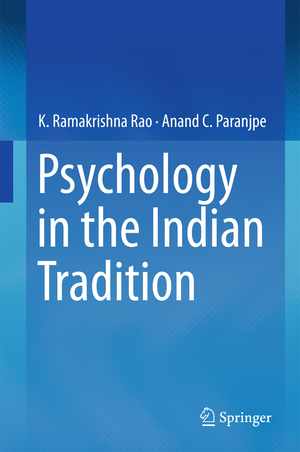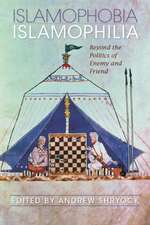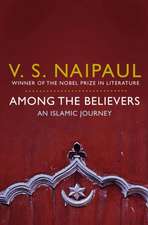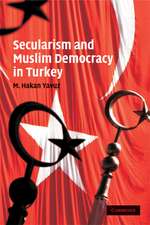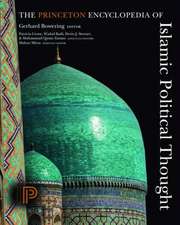Psychology in the Indian Tradition
Autor K. Ramakrishna Rao, Anand C. Paranjpeen Limba Engleză Hardback – 12 sep 2015
The main theme is organized around the thesis that psychology is the study of the person and that the person is a unique composite of body, mind and consciousness. The goal of the person is self-realization. Self-realization consists in the realization of one’s true self as distinct from the manifest ego and it is facilitated by cultivating consciousness. Cultivating consciousness leads to a kind of psycho-spiritual symbiosis resulting in personal transformation, altruistic value orientation and flowering of the hidden human potential.
| Toate formatele și edițiile | Preț | Express |
|---|---|---|
| Paperback (1) | 731.91 lei 6-8 săpt. | |
| Springer India – 23 aug 2016 | 731.91 lei 6-8 săpt. | |
| Hardback (1) | 738.06 lei 6-8 săpt. | |
| Springer India – 12 sep 2015 | 738.06 lei 6-8 săpt. |
Preț: 738.06 lei
Preț vechi: 900.07 lei
-18% Nou
Puncte Express: 1107
Preț estimativ în valută:
141.23€ • 151.02$ • 117.75£
141.23€ • 151.02$ • 117.75£
Carte tipărită la comandă
Livrare economică 17 aprilie-01 mai
Preluare comenzi: 021 569.72.76
Specificații
ISBN-13: 9788132224396
ISBN-10: 8132224396
Pagini: 450
Ilustrații: XVII, 387 p. 3 illus.
Dimensiuni: 155 x 235 x 27 mm
Greutate: 0.74 kg
Ediția:1st ed. 2016
Editura: Springer India
Colecția Springer
Locul publicării:New Delhi, India
ISBN-10: 8132224396
Pagini: 450
Ilustrații: XVII, 387 p. 3 illus.
Dimensiuni: 155 x 235 x 27 mm
Greutate: 0.74 kg
Ediția:1st ed. 2016
Editura: Springer India
Colecția Springer
Locul publicării:New Delhi, India
Public țintă
ResearchCuprins
Chapter 1. Scope, Substance and Methods of Study.- Chapter 2. Cultural Climate and Conceptual Roots of Indian Psychology.- Chapter 3. Centrality of Consciousness.- Chapter 4. Mind-Body Complex.- Chapter 5. Self, Person and Personality.- Chapter 6. Cognition, Emotion and Volition.- Chapter 7. Applied Indian Psychology.- Chapter 8. Meditation and Applied Yoga.- Chapter 9. Self-Realization: Illustrative Case Studies.- Chapter 10. Personal and Social Transformation Gandhi’s Psychology of Nonviolence.
Recenzii
“Rao and Paranjpe are masters in illuminating the rich, complex, and sophisticated tradition of Indian psychology. In the present work, they do so in a way that enables us who live outside this culture not only to appreciate its history, its practices, and its significance in today’s world, but as well to absorb its potentials. This is not only a careful and systematic synopsis of a complex array of concepts, values and practices; it is also a compelling invitation to “try it on” – both conceptually and in our daily lives. The need for such understanding and appreciation of who we are as human beings has never been greater.” (Kenneth J. Gergen, Professor of Psychology, Swarthmore College, Pennsylvania, USA)
“This book offers a way out of the morass in which psychology in India, cut off from its native habitus, finds itself today. In mining the rich vein of psychological insight in the Indian tradition, especially Yoga and Advaita, it outlines a new paradigm for the discipline which is Indian in essence and universal in its reach and application. [It is] a major work that is certain to provoke much discussion among students of psychology, philosophy and the social sciences.” (Sudhir Kakar, psychoanalyst, writer, and Honorary Professor of Psychology, GITAM University, India)
“Are mind, body and consciousness irreducible? Does mind have the potential to survive after death? In the western world these are preoccupations of philosophy and religion. Indian psychology does not make such distinctions. Professors Rao and Paranjpe take up the challenge of providing answers for these and other equally intriguing and challenging questions on the nature of mind, exploring the new frontiers of Indian psychology. It is indeed a remarkably laudable effort.” (Malavika Kapur, Professor, National Institute of Advanced Studies, Bangalore)
“[This book] is far more than an indigenous South Asian psychology. It is a systematic and comprehensive explication of an ancient yet contemporary classical Indian theory of the implications of the very existence of consciousness and the close connection between mental states and the spiritual nature of human beings.” (Richard Shweder, Harold Higgins Swift Distinguished Service Professor, Department of Comparative Human Development, University of Chicago, USA)
“This book … is an outstanding contribution to psychology and human sciences in more ways than one. … The work deserves the serious attention of all those who believe that humans are, and desire to be, more than their bodily selves.” (Rama Charan Tripathi, Former Director, G.B. Pant Social Science Institute, Allahabad, and former Professor and Head, Department of Psychology, Allahabad University, India)
“This book is a serious advancement of basic ideas in new science of psychology that transcends the limited perspectives of Euro-American assumptions of the deep bases of the human psyche.” (Jaan Valsiner, Niels Bohr Professor of Cultural Psychology, Aalborg Universitet, Denmark)
“This book offers a way out of the morass in which psychology in India, cut off from its native habitus, finds itself today. In mining the rich vein of psychological insight in the Indian tradition, especially Yoga and Advaita, it outlines a new paradigm for the discipline which is Indian in essence and universal in its reach and application. [It is] a major work that is certain to provoke much discussion among students of psychology, philosophy and the social sciences.” (Sudhir Kakar, psychoanalyst, writer, and Honorary Professor of Psychology, GITAM University, India)
“Are mind, body and consciousness irreducible? Does mind have the potential to survive after death? In the western world these are preoccupations of philosophy and religion. Indian psychology does not make such distinctions. Professors Rao and Paranjpe take up the challenge of providing answers for these and other equally intriguing and challenging questions on the nature of mind, exploring the new frontiers of Indian psychology. It is indeed a remarkably laudable effort.” (Malavika Kapur, Professor, National Institute of Advanced Studies, Bangalore)
“[This book] is far more than an indigenous South Asian psychology. It is a systematic and comprehensive explication of an ancient yet contemporary classical Indian theory of the implications of the very existence of consciousness and the close connection between mental states and the spiritual nature of human beings.” (Richard Shweder, Harold Higgins Swift Distinguished Service Professor, Department of Comparative Human Development, University of Chicago, USA)
“This book … is an outstanding contribution to psychology and human sciences in more ways than one. … The work deserves the serious attention of all those who believe that humans are, and desire to be, more than their bodily selves.” (Rama Charan Tripathi, Former Director, G.B. Pant Social Science Institute, Allahabad, and former Professor and Head, Department of Psychology, Allahabad University, India)
“This book is a serious advancement of basic ideas in new science of psychology that transcends the limited perspectives of Euro-American assumptions of the deep bases of the human psyche.” (Jaan Valsiner, Niels Bohr Professor of Cultural Psychology, Aalborg Universitet, Denmark)
Notă biografică
K. Ramakrishna Rao is Chancellor and Chairman of the Center for Gandhian Studies, GITAM University. He is also a National Fellow of the Indian Council of Social Sciences Research and Honorary Distinguished Professor of Psychology at Andhra University. His previous academic positions include Chairman, Indian Council of Philosophical Research, Executive Director Foundation for Research on the Nature of Man (USA), Vice-Chancellor and Professor of Psychology, Andhra University. Prof. Rao published 24 books and nearly 300 research papers and reports. His recent books include Consciousness Studies: Cross-Cultural Perspectives (Macfarland), Gandhi and Applied Spirituality (Indian Council of Philosophical Research), Cognitive Anomalies, Consciousness and Yoga (Matrix Publishers and the Centre for the Studies of Civilizations) and Cultivating Consciousness: An East-West Journey (DK Printworld). He has edited the Journal of Indian Psychology and the Journal of Parapsychology and served as the President of the Indian Academy of Applied Psychology and Parapsychological Association (USA).
Anand C. Paranjpe is Emeritus Professor of Psychology and Humanities, Simon Fraser University, Canada. After completion of his doctorate at Pune University in India, he did post-doctoral research under the direction of Prof. Erik H. Erikson at Harvard University. He started teaching at Simon Fraser University in 1967 and retired from there in 2001. His main publications include In Search of Identity (Macmillan, India & Wiley Interscience, 1975), Theoretical Psychology: The meeting of East and West (Plenum, 1984), Asian Contributions to Psychology (co-edited with David Ho & R.W. Reiber, Praeger, 1988), Self and Identity in Modern Psychology and Indian Thought (Plenum, 1998), and the Handbook of Indian Psychology (co-edited with K. Ramakrishna Rao & Ajit Dalal, Cambridge UP, India, 2008).
Anand C. Paranjpe is Emeritus Professor of Psychology and Humanities, Simon Fraser University, Canada. After completion of his doctorate at Pune University in India, he did post-doctoral research under the direction of Prof. Erik H. Erikson at Harvard University. He started teaching at Simon Fraser University in 1967 and retired from there in 2001. His main publications include In Search of Identity (Macmillan, India & Wiley Interscience, 1975), Theoretical Psychology: The meeting of East and West (Plenum, 1984), Asian Contributions to Psychology (co-edited with David Ho & R.W. Reiber, Praeger, 1988), Self and Identity in Modern Psychology and Indian Thought (Plenum, 1998), and the Handbook of Indian Psychology (co-edited with K. Ramakrishna Rao & Ajit Dalal, Cambridge UP, India, 2008).
Textul de pe ultima copertă
This authoritative volume, written by two well-known psychologist-philosophers, presents a model of the person and its implications for psychological theory and practice. Professors Ramakrishna Rao and Anand Paranjpe draw the contours of Indian psychology, describe the methods of study, explain crucial concepts, and discuss the central ideas and their application, illustrating them with insightful case studies and judicious reviews of available research data and existing scholarly literature.
The main theme is organized around the thesis that psychology is the study of the person and that the person is a unique composite of body, mind and consciousness. The goal of the person is self-realization. Self-realization consists in the realization of one’s true self as distinct from the manifest ego and it is facilitated by cultivating consciousness. Cultivating consciousness leads to a kind of psycho-spiritual symbiosis resulting in personal transformation, altruistic value orientation and flowering of the hidden human potential.
The main theme is organized around the thesis that psychology is the study of the person and that the person is a unique composite of body, mind and consciousness. The goal of the person is self-realization. Self-realization consists in the realization of one’s true self as distinct from the manifest ego and it is facilitated by cultivating consciousness. Cultivating consciousness leads to a kind of psycho-spiritual symbiosis resulting in personal transformation, altruistic value orientation and flowering of the hidden human potential.
Caracteristici
Throws light on the enigma of the mind-consciousness interface and addresses meaningfully issues arising from science-spirituality divide Provides an alternative model to the cerebro-centric image of the person Stimulates fresh ideas developed from classical Indian thought Includes supplementary material: sn.pub/extras
